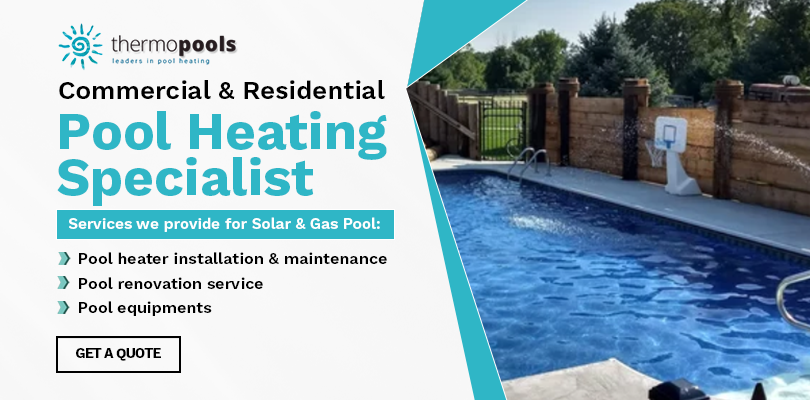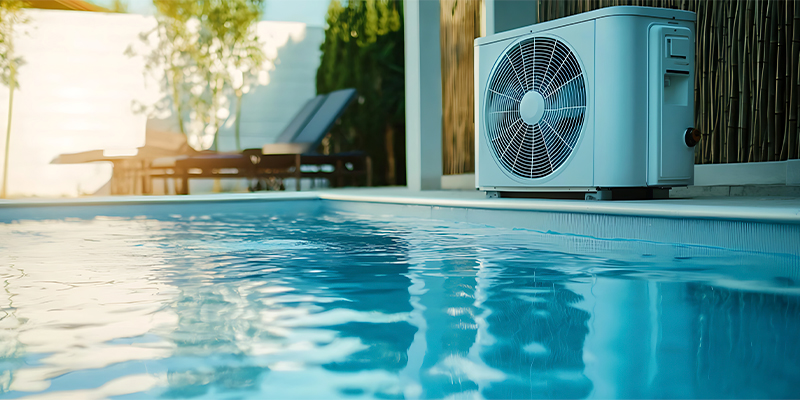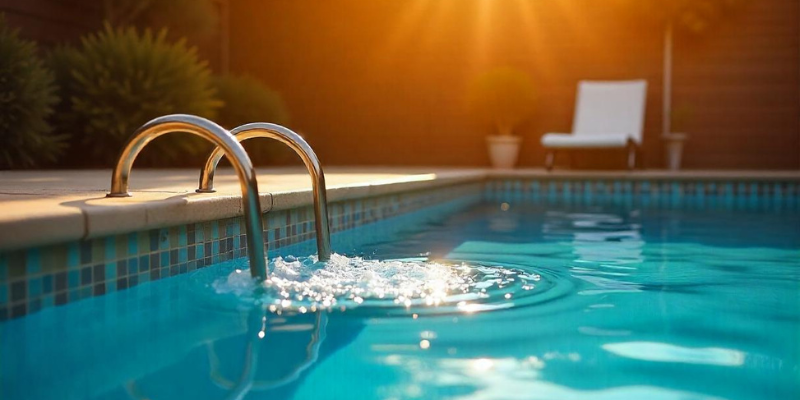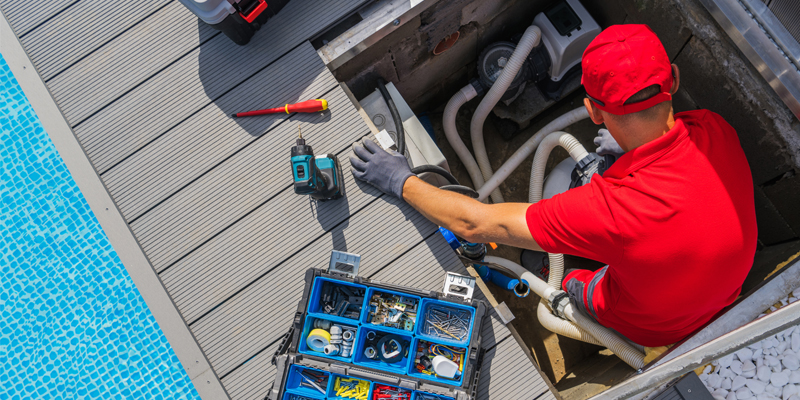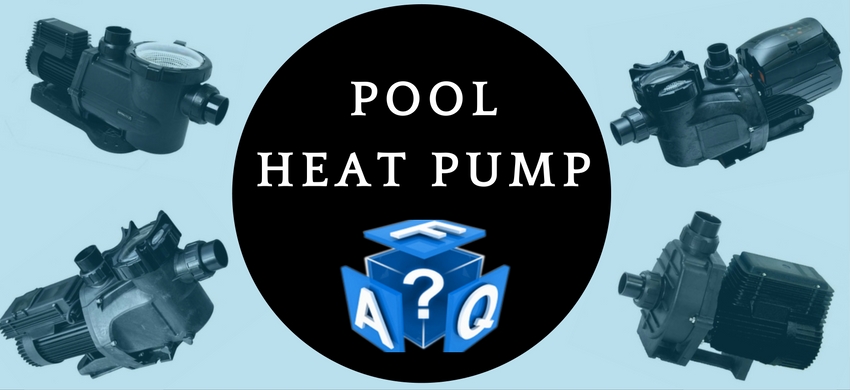
If you’re thinking about buying a brand-new heat pump for your pool, it’s obvious that you may have some questions in your mind for which you’re seeking answers. These common FAQs about pool heat pumps will help new buyers looking to buy a pool heat pump as well as existing users already using the pool heat pump.
This Pool Heat Pump Common FAQs is divided into two parts:
- Pool Heat Pump Common FAQs for New Buyers
- Pool Heat Pump Common FAQs for Existing Users
I. Pool Heat Pump Common FAQs for New Buyers
1. How does a pool heat pump operate?
 A heat pump makes use of electricity to collect natural heat. When the heat pump rotates its fan and draws in warm air, the warm air passes over an evaporator coil and reacts with a refrigerant inside the tubes, which causes it to produce a warm gas that is diverted to a compressor. The warm gas is compressed into a hot gas by the compressor. At the last stage of the process, the hot gas move towards the heat exchanger wherein it heats up an inner titanium tube. As water makes its way through the outer PVC tubing of the heat exchanger, the water is warmed by the inner heated titanium tubing. From this point, the heated water is pumped into the pool; simultaneously, more water is pumped into the heater. Likewise, the heating procedure gets repeated until the pool attains the desired target temperature, which is specified on the heat pump.
A heat pump makes use of electricity to collect natural heat. When the heat pump rotates its fan and draws in warm air, the warm air passes over an evaporator coil and reacts with a refrigerant inside the tubes, which causes it to produce a warm gas that is diverted to a compressor. The warm gas is compressed into a hot gas by the compressor. At the last stage of the process, the hot gas move towards the heat exchanger wherein it heats up an inner titanium tube. As water makes its way through the outer PVC tubing of the heat exchanger, the water is warmed by the inner heated titanium tubing. From this point, the heated water is pumped into the pool; simultaneously, more water is pumped into the heater. Likewise, the heating procedure gets repeated until the pool attains the desired target temperature, which is specified on the heat pump.
2. How long will the pool heat pump endure?
Pool heat pumps will easily endure for 10 to 20 years without any maintenance. However, with proper maintenance and care, a pool heat pump can last a lifetime.
3. What size of the heat pump should I purchase?
Your location and the size of your pool are the two major considerations for deciding the size of your heat pump. Generally, if your pool is bigger, you’ll need a bigger pool heater. Secondly, it depends on where you live i.e. your location – what type of climate your location experience i.e. moderate or colder climate, etc., accordingly a smaller or bigger pool heater may be required for maintaining your desired temperature.
4. How much time will the heat pump take to heat my pool?
Heating time will depend on the pool size, outside temperature as well as effective use of a solar pool cover.
5. What’s the coldest temperature at which a heat pump can operate?
The coldest temperature most heat pumps will operate at is 10 degrees Celsius. Nevertheless, certified low-temperature performance heat pumps can operate at temperatures falling to -1.11 degrees Celsius. Remember, even though a heat pump will still heat up to its upper-limit cut-off temperature, the efficiency of heating is often compromised.
II. Pool Heat Pump Common FAQs for Existing Users
1. Why does my pool heat pump leak?
 Normally, it happens because of the natural condensation process. Every type of heat pump will sweat and create a small puddle occasionally. This normally takes place when the heat pump is defrosting. However, an extremely big puddle of water around the unit may demand some pool heat pump troubleshooting. To determine where the leak is coming from, first switch off the heat pump and continue operating the pool pump. Wait for a few hours, then go back and check the water around the pump. If most of the water has evaporated then you’re likely on the safer side. Nonetheless, in the likelihood that the puddle remains, a few more things are there, that you can perform. To examine for any chlorine content, test the water with some drops of reagent or test strips. Routine condensation won’t test for any chlorine, so if chlorine is there, the leak is definitely coming from the heat pump. Call a qualified technician, let him thoroughly inspect the heat pump and fix the issue.
Normally, it happens because of the natural condensation process. Every type of heat pump will sweat and create a small puddle occasionally. This normally takes place when the heat pump is defrosting. However, an extremely big puddle of water around the unit may demand some pool heat pump troubleshooting. To determine where the leak is coming from, first switch off the heat pump and continue operating the pool pump. Wait for a few hours, then go back and check the water around the pump. If most of the water has evaporated then you’re likely on the safer side. Nonetheless, in the likelihood that the puddle remains, a few more things are there, that you can perform. To examine for any chlorine content, test the water with some drops of reagent or test strips. Routine condensation won’t test for any chlorine, so if chlorine is there, the leak is definitely coming from the heat pump. Call a qualified technician, let him thoroughly inspect the heat pump and fix the issue.
2. How is it that my pool heat pump operates but does not heat?
There are several reasons behind this kind of situation, so you should inspect the following things:
- Inspect the air temperature. To function most efficiently, a pool heat pump needs warm air. However, the heat pump will run longer to recompense in cooler temperatures.
- Check and ensure that your pool pump is transmitting sufficient water to your heater. A heat pump requires a balanced supply of water to manage the transfer and production of heat.
- Inspect the vents for any rubbles or hindrances of any kind and clear them off. This will make sure most favorable airflow, which is critical to an air-source heat pump’s heating process.
3. Why is an “FLO” error displayed by my heat pump?
Generally, the error code “FLO” signals a water pressure problem. This means, the water flow is being limited or that none is being detected at all. At times, water flow problems can be induced by an obstruction in the pool system, arising anywhere from the filter to the pump and skimmer baskets. Here, the best thing to do is to clean out the skimmer and then clean off the pump basket. Next, inspect your filter to ensure it’s clean and facilitates water flow at the right pressure. If everything is inspected and the pump is surely obtaining adequate water, then the problem is probably with the faulty water pressure switch. Fortunately, this is not expensive and easy to change.
4. Why is my pool heater often shutting off?
When a heat pump often shuts off, it normally indicates that either there is an electrical or water pressure issue.
- If error codes like “FLO” or “LO/HI” are displayed by your heat pump then the issue is linked to the water pressure. Fixing these issues, requires troubleshooting your pool pump or the heater. Instead, it’s better to call a qualified technician for fixing such technical issues.
- In contrast, if your pump is working and not showing any error codes then there might be an issue with the power supply, so you’ll need to check the electrical setup. For this, you need to go to the heat pump and inspect electric terminals for any type of damage or rust formation. Next, inspect the wiring that starts with the pump and leads toward the breaker for any wear. Finally, examine the breaker and confirm that it is transmitting sufficient power to the heat pump. Again, if you aren’t very comfortable with electrical wiring and stuff, then it is better to call in an experienced electrician to fix the problem.
Thermo Pools is an established company (100% Australian-owned and operated) that supplies high-quality domestic pool heat pumps as well as commercial pool heat pumps.
If you want to enquire about an inverter heat pump & solar pool heating system, call us at Thermo Pools at 02 8850 4030 & Check our Google Reviews, and one of our expert and friendly teams will be happy to serve you!





